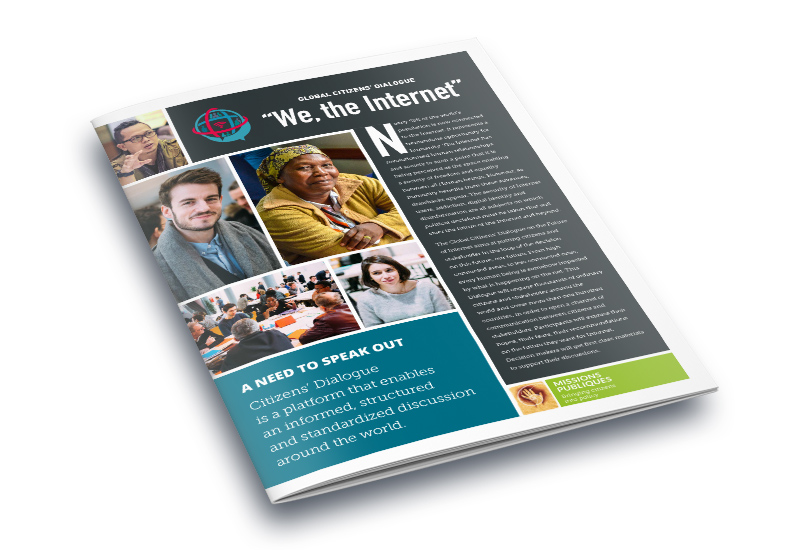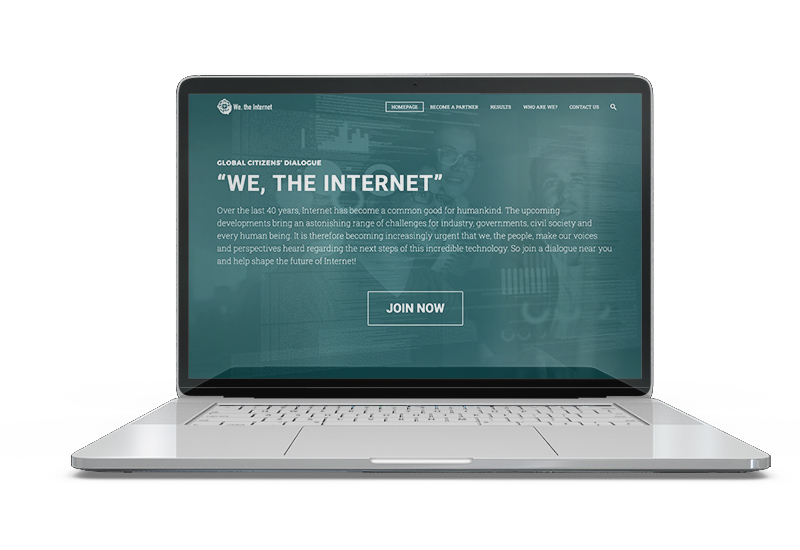CONTEXT AND GOALS
Almost 55% of the world’s population now has Internet connection. This is a real opportunity for humanity, but it’s also an unprecedented challenge, especially in terms of security, equality and even truth.
Every digital innovation raises its share of questions and debates for the whole of society: businesses, governments, civil society but also for each of us individually. It therefore seems legitimate to include all stakeholders in discussions to understand their hopes and needs and to create an Internet that is understandable, accessible, and useful for all together.
PROCEDURE
The project began in 2018 with pilot workshops in more than 12 countries around the world exploring the issues that are most important to citizens. The process was pursued and elaborated in 2019 with a series of five workshops, one on each continent, looking in greater depth at two key topics: disinformation and digital identity. The results of these five workshops were collected, analyzed, and presented at the 2019 Internet Governance Forum.
In 2020 we scaled up the process in more than 80 countries, with discussions held on one single day and following one single method. In addition to the citizens’ dialogues, stakeholders’ dialogues fed the report on Digital Cooperation of the United Nations High Level Panel.
OUR ADDED VALUE
“We The Internet” is the first debate of its kind to engage a coalition of strategic stakeholders brought together by Missions Publiques and representing the key players in the field: international organizations (UNESCO, European Commission, Council of Europe) governments (Germany, Switzerland), the private sector (Google, Facebook, Mozilla), civil society (The Internet Society, Web Foundation, Wikimedia Foundation, Particip’action), and the scientific community (WZB Berlin, Arizona State University for example).
The project establishes a dialogue between stakeholders, decision-makers, and citizens of the world.
RESULTS
“We The Internet” has proven that the future of Internet is a subject to be debated with citizens. Only with deliberative processes such as We The Internet will decision-makers be able to make the best and legitimate decisions.
The outcome of the preliminary dialogues in 2018 put the participants’ agenda on the table. That year, the participants brought up the question of the environment and this has now been officially added to the agenda of the Global Internet Governance Forum in 2020.
The pilots run in 2019 produced some clear results on the issues of digital identity and disinformation.
In 2020, We, The Internet engaged thousands of Citizens
and hundreds of stakeholders in a deliberative process
on the future of the Internet and its governance. It was a
worlds’ first that covered 80+ countries.
Topics addressed in the Citizens’ Dialogue were: Digital Identity and Data governance, The digital public sphere and Disinformation, Artificial Intelligence, and Internet Governance. Citizens gave strong recommendations regarding the key following questions:
- how should we collectively handle the data we produce online? Who should handle it and why?
- How can we fight disinformation and with what tools?
- Which actors should take the lead in fighting disinformation?
- How can we made today’s Internet governance more legitimate?
- How should artificial intelligence be governed? And how should we make decisions on all these
topics? - What is a relevant and legitimate architecture for
the future of digital cooperation?
Five key visions emerged out of the Citizens’ Dialogue and reflect what the general public will think in
a couple of years from now.
To learn about the findings, recommendations and solutions put forth by citizens, read our report on our dedicated website where you will also find infographics, a toolkit to run your own We The Internet Citizens’ Dialogue as well as all the information you need.
The We The Internet website: https://wetheinternet.org
Follow us on our We The Internet LinkedIn page here: https://www.linkedin.com/company/wetheinternet/?viewAsMember=true
#WeTheInternet
KEY FIGURES
DELIVERABLES
Reports from the citizens’ dialogues held around the world are used to create publications with stakeholders, experts, and researchers. The results are then shared worldwide as part of our impact strategy. Some examples below:





